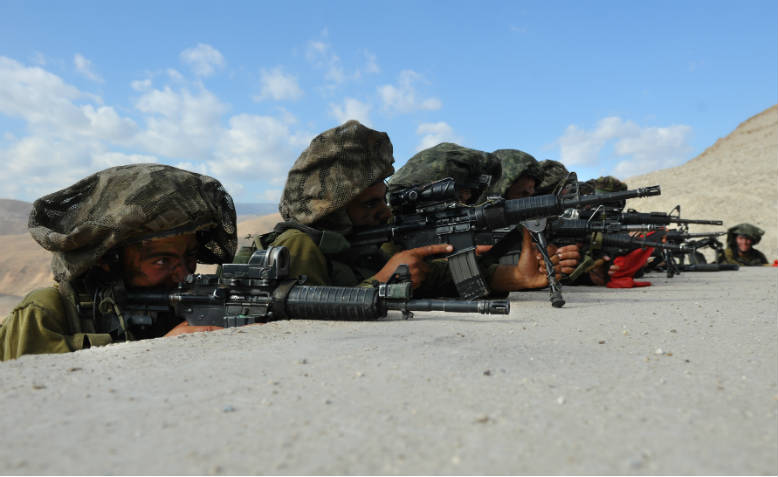 IDF paratroopers during a training exercise. Photo: Wikimedia Commons
IDF paratroopers during a training exercise. Photo: Wikimedia Commons
Israel is not acting in self-defence, it’s the Palestinian people who are under attack and we need to stand with them, argues Shabbir Lakha
One of the biggest myths perpetuated about the so-called Israel-Palestine conflict is that there are periods of peace and periods of violence. The idea that things are normal until they are not is what allows the media and politicians to immediately blame Hamas for “starting it”.
For the people of Gaza, things are never normal. When F-16 fighter jets are not raining bombs over one of the most densely populated areas on the planet, Gazans are living with the reality of 94% of their water being unfit for human consumption, 8 hours of electricity a day if they’re lucky, mass unemployment and no freedom to move. Their fishermen are shot at and their injured are not allowed to leave Gaza to receive necessary medical treatment.
Before Hamas fired homemade rockets into Israel, 86% of which were intercepted by Israel’s sophisticated Iron Dome system, Israeli forces shot dead 2 unarmed Palestinian protesters near the border fence, adding to a death toll of over 250 since the Great Return March began in March last year. Before that, there has been 12 years of an unrelenting siege and several full-scale offensives that have killed thousands of Palestinians.
The airstrikes carried out by Israel on the weekend killed 25 Palestinians in under 48 hours, including a 14 month-old-baby and her pregnant mother. The airstrikes deliberately targeted residential buildings, libraries, cultural centres and utility infrastructure. The idea that the Israeli armed forces try to avoid civilian casualties is simply untrue.
In fact, the Israeli government admitted that Hamas and Islamic Jihad were willing to agree to a ceasefire on Sunday morning, but the Israeli government continued its assault on over 200 sites in Gaza, which killed several people including another pregnant woman, because they wanted to “send a message”.
Yet mainstream reportage paints a picture of equivalence between the violence carried out by the two sides. World leaders lined up to condemn Hamas and give their solidarity to Israel, including Britain’s foreign secretary who said his thoughts were with “the families of innocent civilians killed and affected by Hamas’ indiscriminate and abhorrent rocket attacks.”
Unsurprisingly, Donald Trump tweeted:
“Once again, Israel faces a barrage of deadly rocket attacks by terrorist groups Hamas and Islamic Jihad. We support Israel 100% in its defense of its citizens”
And this isn’t limited to Gaza. Though it’s given even less coverage, Palestinians in the West Bank are routinely violently attacked and arrested at peaceful protests in villages near the Apartheid Wall or at the Al Aqsa Mosque when Israeli forces decide to restrict access. Palestinian children are rounded up in nightly house raids across the West Bank, can be sentenced by a military court to up to 20 years for throwing a stone and can be held indefinitely without trial or evidence under administrative detention.
This is all set to get a lot worse with either Trump’s “Deal of the century” or Netanyahu’s plan to annex settlements, and possibly whole swathes of Area C, in the West Bank – whichever comes first.
For Palestinians, the message from Israel and the world is that they must sit back and accept that they don’t have the right to freedom or equality and even as their right to existence is being further eroded. If any group or faction among them engages in violent resistance, they are all liable for lethal collective punishment; if they peacefully protest or engage in non-violent tactics of boycott they are liable to being arrested and imprisoned.
This is why the Boycott Eurovision campaign is so important. From next week when the contest begins, Israel is not an apartheid state, it’s the host of an international song contest. As far as the world will be concerned, it doesn’t matter that mere kilometres from the stage on their screens, Palestinians are living under military occupation and being shot at, bombed and killed, and don’t have the right to oppose those conditions.
And those who want to show their solidarity with Palestine abroad are also being cracked down upon. In the United States, a number of states have already adopted laws that make BDS illegal, and there is a concerted campaign to smear Congresswoman Ilhan Omar and anyone who criticises Israel as antisemitic. This is not unlike the attacks on Jeremy Corbyn in Britain, the attacks on student activists that call Israel an apartheid state and the increasingly accepted conflation of anti-Zionism with antisemitism in the mainstream.
The only way that we can counter these attacks, that we can send our solidarity to the people of Palestine, that we can oppose our government’s uncritical support for Israel and complicity in its crimes, is to stand up and make our voices heard. We have to collectively organise in our communities, workplaces, universities and schools and win the argument that Palestine is still the issue – even and especially during periods of “quiet”, but more than ever right now as they face the full force of Netanyahu and Trump.
And we have to show it, loudly and proudly, on the streets. This Saturday’s national demonstration is an opportunity for the Palestine solidarity movement that mobilised a quarter of a million people in defence of Gaza ten years ago and hundreds of thousands of people since, to show that we are still here and we aren’t going anywhere. On the 4th of June when Donald Trump comes to Britain, there are many reasons why people will be shutting down the streets of London in opposition to him – it’s up to us to make sure solidarity with Palestine is a prominent and visible part of that demonstration.

